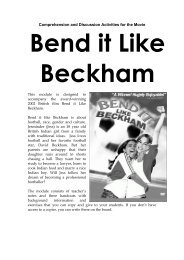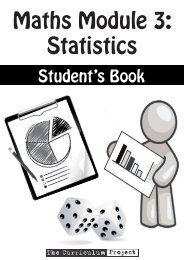General English Pre-Intermediate Modules 1-4 Teacher's Guide (2.1 ...
General English Pre-Intermediate Modules 1-4 Teacher's Guide (2.1 ...
General English Pre-Intermediate Modules 1-4 Teacher's Guide (2.1 ...
Create successful ePaper yourself
Turn your PDF publications into a flip-book with our unique Google optimized e-Paper software.
2. wh- questions<br />
• Where is he from<br />
not: Where he is from<br />
• Who are his parents<br />
not: Who his parents are<br />
be or do<br />
In present simple questions and negative statements<br />
we use:<br />
1. Do with verbs.<br />
• Do you like fish not: Are you like fish<br />
• It doesn’t live here. not: It isn’t live here.<br />
2. To be with nouns, pronouns, adjectives, adverbs,<br />
prepositions, etc.<br />
• Are you Ko Ko not: Do you Ko Ko<br />
• They aren’t happy. not: They don’t happy.<br />
• Is it at home not: Does it at home<br />
Adverbs of frequency<br />
100%<br />
always<br />
usually<br />
often<br />
sometimes<br />
not often<br />
never<br />
0%<br />
We usually put the adverb of frequency:<br />
1. After the verb to be.<br />
• I’m often late for work.<br />
3. After an auxiliary verb.<br />
• Snakes don’t usually bite people.<br />
2. Before other verbs.<br />
• We sometimes play football at the weekend.<br />
Usually, often and sometimes can also go at the start<br />
or the end of a clause.<br />
• Usually Tom gets up at 6 o’clock.<br />
• Aung Aung gets angry sometimes.<br />
• Often I don’t have breakfast.<br />
Module Two<br />
Imperatives<br />
1. We use imperatives to give orders and<br />
instructions. We form them with base form of<br />
the verb.<br />
• Answer these questions.<br />
• Do your homework.<br />
2. Negative imperatives use don’t.<br />
• Don’t hit me. • Don’t talk loudly.<br />
there is/are<br />
Positive statements<br />
singular<br />
’s a cat<br />
uncountable There (is) some oil<br />
plural are some dogs<br />
Negative statements<br />
singular<br />
a cat<br />
isn’t<br />
uncountable There<br />
any oil<br />
plural aren’t any dogs<br />
NOTE: There isn’t/aren’t any and there is/are no have<br />
the same meaning:<br />
• There is no water. = There isn’t any water.<br />
• There are no dogs. = There aren’t any dogs.<br />
Questions and answers<br />
In questions, we put the verb before the subject.<br />
1. yes/no questions and short answers<br />
statement: There is a cinema<br />
question:<br />
Is there a cinema<br />
answer: • Yes, there is. not: Yes, there’s.<br />
• No, there isn’t. / No, there’s not.<br />
statement: There are some computers.<br />
question: Are there any computers<br />
answer: • Yes, there are. • No, there aren’t. .<br />
2. wh- questions<br />
• How many people are there in the village<br />
have got<br />
1. The meaning is usually the same as there is/are.<br />
• The house has got three bedrooms.<br />
= There are three bedrooms in the house.<br />
2. The meaning is the same as have.<br />
• I’ve got a big dictionary. = I have a big dictionary.<br />
BUT: Have is:<br />
a. More formal.<br />
b. More common in American <strong>English</strong>.<br />
c. Used with actions.<br />
• I have dinner at 7pm.<br />
not: I have got dinner at 7pm.<br />
d. Used in all tenses.<br />
• I had long hair last year.<br />
not: I had got long hair last year.<br />
• I will have long hair soon.<br />
not: I will have got long hair soon.<br />
76 Language Reference


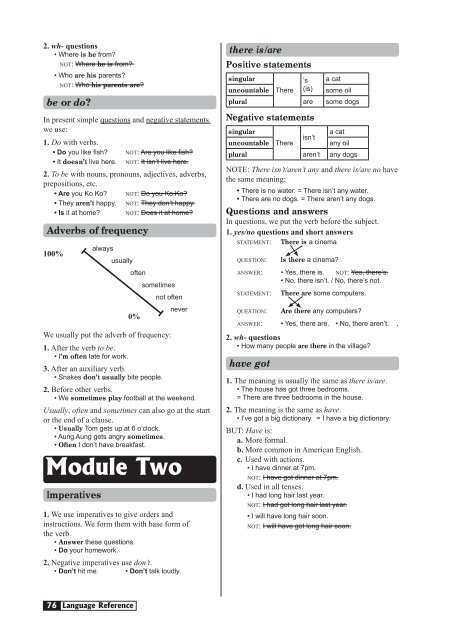
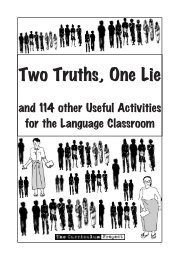
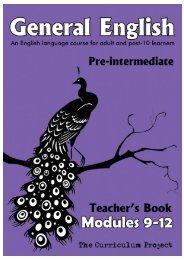





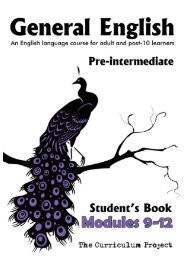



![[Eng] Nov 2012 DRAFT - The Curriculum Project](https://img.yumpu.com/45590859/1/184x260/eng-nov-2012-draft-the-curriculum-project.jpg?quality=85)
